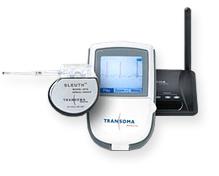
April 14, 2009 - Transoma Medical Inc. announced the first enrollment and implant of the Sleuth AT, a wireless, automated implantable cardiac monitoring (ICM) system with programmable and frequent ECG sampling, in a long-term study to monitor patients who suffered a cryptogenic stroke of unknown origin to determine if atrial fibrillation (AF) is present.
The implant was performed April 10 by Emile Daoud, M.D., an electrophysiologist at Ohio State University Medical Center in Columbus. The company received FDA 510(k) marketing clearance for Sleuth AT in February.
“It is believed that as many as 20 percent of cryptogenic strokes are caused by asymptomatic atrial fibrillation,” said Dr. Daoud. “Due to the nature of paroxysmal atrial fibrillation it may remain undetected by standard diagnostic methods and may be an under-recognized cause of cryptogenic stroke. With Sleuth AT, we can continuously monitor the patient for AF over a prolonged period to determine if, when and for how long AF is present.”
The Long-Term Cardiac Monitoring for Detection of Atrial Fibrillation after Cryptogenic Stroke is a pilot study involving five centers in Canada and the U.S. The investigators driving this important clinical study are Andrew Krahn, M.D., from the London Health Sciences Centre University Hospital in London, Ontario and Dr. Daoud. The primary endpoint of the study is to determine the incidence of AF at one year from Sleuth AT implantation in patients who have had cryptogenic stroke.
The company said the Sleuth AT allows physicians to program the capture of high-quality ECG strips at frequent intervals, providing a new level of insight into complex arrhythmias, which are often asymptomatic and frequently changing. These captured ECG strips are automatically transferred to a 24/7 monitoring center, staffed by certified cardiac technicians, who classify and notify physicians of the presence of a wide variety of cardiac arrhythmias such as ventricular tachycardia, bradycardia, supraventricular tachycardia and AF.
“It will be very interesting to see the results that come out of this study” said Geoff Eubank, M.D., a neurologist at Neurological Associates Inc. in Columbus, who frequently treats cryptogenic stroke patients and partners with Dr. Daoud for evaluation of these patients. “Monitoring and diagnostic technology up until now has been limited and sporadic in providing data. I’m hopeful that the long-term, continuous and automated nature of this system will prove more effective in delivering the information we need to effectively treat these patients and prevent future strokes.”
Determining the root cause of stroke is essential to prescribing appropriate secondary prevention, and one of the most important findings in ischemic stroke patients is AF. Detecting AF can be challenging, given that asymptomatic AF, although common, can be difficult to diagnose as a result of its transient nature.
Earlier studies have shown that with conventional methods AF cannot be detected in all cases and that a prolonged duration of monitoring may be required to effectively manage stroke patients. The importance that AF was found to have in the etiology and clinical application of stroke patients, spurred many studies that investigated the role cardiac monitoring plays in stroke management. Due to the asymptomatic and transient nature, paroxysmal (sudden onset) AF detection does not often occur within the bounds of the admission ECG or 24-hour Holter monitoring; thus, longer monitoring periods were explored. Results showed that longer monitoring periods are likely to increase the yield of new-onset AF.
For more information: www.transoma.com


 January 05, 2026
January 05, 2026 









